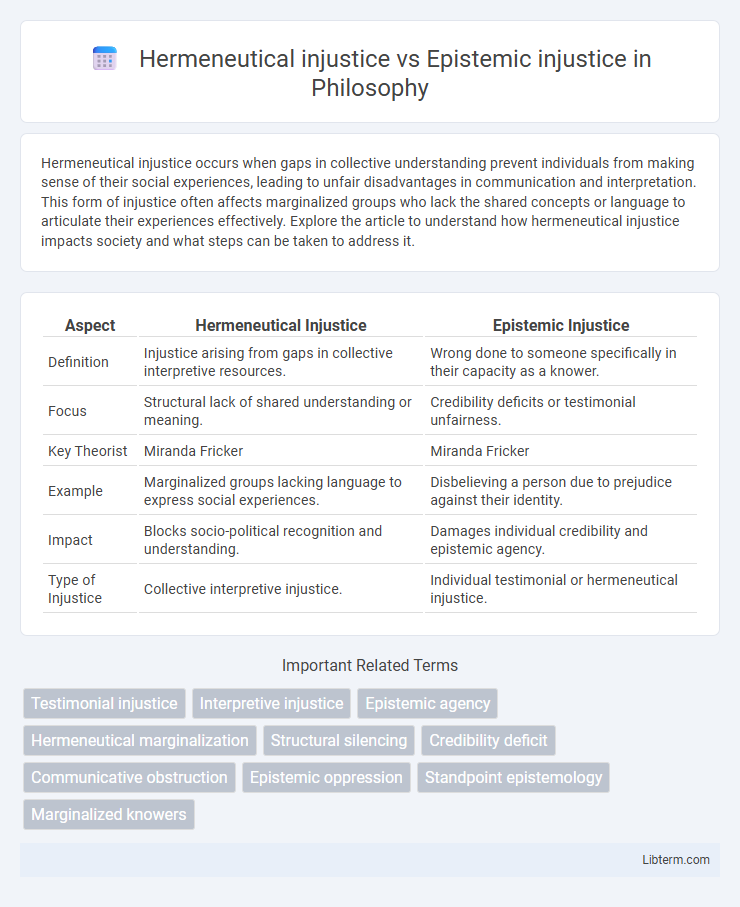Hermeneutical injustice occurs when gaps in collective understanding prevent individuals from making sense of their social experiences, leading to unfair disadvantages in communication and interpretation. This form of injustice often affects marginalized groups who lack the shared concepts or language to articulate their experiences effectively. Explore the article to understand how hermeneutical injustice impacts society and what steps can be taken to address it.
Table of Comparison
| Aspect | Hermeneutical Injustice | Epistemic Injustice |
|---|---|---|
| Definition | Injustice arising from gaps in collective interpretive resources. | Wrong done to someone specifically in their capacity as a knower. |
| Focus | Structural lack of shared understanding or meaning. | Credibility deficits or testimonial unfairness. |
| Key Theorist | Miranda Fricker | Miranda Fricker |
| Example | Marginalized groups lacking language to express social experiences. | Disbelieving a person due to prejudice against their identity. |
| Impact | Blocks socio-political recognition and understanding. | Damages individual credibility and epistemic agency. |
| Type of Injustice | Collective interpretive injustice. | Individual testimonial or hermeneutical injustice. |
Introduction to Hermeneutical and Epistemic Injustice
Hermeneutical injustice occurs when a structural gap in collective interpretive resources prevents individuals from making sense of their social experiences, leading to misrepresentation or marginalization. Epistemic injustice encompasses a broader range of unfair practices in knowledge production and dissemination, including testimonial injustice where a speaker's credibility is unjustly deflated. Both forms highlight the intersection of power and knowledge, emphasizing how social inequalities distort understanding and communication.
Defining Epistemic Injustice
Epistemic injustice occurs when individuals are wronged specifically in their capacity as knowers, encompassing two main types: testimonial injustice, where a speaker's credibility is unfairly deflated due to prejudice, and hermeneutical injustice, which arises when a gap in collective interpretive resources marginalizes an individual's ability to make sense of their social experiences. Hermeneutical injustice represents a subset of epistemic injustice characterized by structural disadvantages in understanding or communicating lived experiences. Addressing epistemic injustice requires recognizing and rectifying these deeply embedded epistemic asymmetries that hinder individuals' participation in knowledge practices.
Understanding Hermeneutical Injustice
Hermeneutical injustice occurs when a lack of collective interpretive resources prevents marginalized groups from making sense of their social experiences, leading to a gap in understanding and communication. This form of injustice specifically impairs the ability to articulate and interpret oppressive conditions, thereby silencing affected individuals in societal discourse. It differs from broader epistemic injustice by highlighting structural gaps in knowledge production that hinder marginalized groups' participation in meaning-making processes.
Key Differences Between Hermeneutical and Epistemic Injustice
Hermeneutical injustice arises when a gap in collective interpretive resources prevents someone from making sense of their social experiences, often due to marginalized groups lacking the concepts to express their realities. Epistemic injustice, a broader category, includes both testimonial injustice--where a speaker's credibility is unfairly deflated--and hermeneutical injustice as a subtype. The key difference lies in hermeneutical injustice specifically targeting the interpretive frameworks that hinder understanding, while epistemic injustice encompasses all forms of epistemological harm related to knowledge and credibility.
Historical Contexts of Epistemic and Hermeneutical Injustice
Epistemic injustice, conceptualized by Miranda Fricker, involves the unfair distribution of knowledge and credibility, often rooted in power imbalances throughout history such as colonialism and systemic racism. Hermeneutical injustice specifically refers to a gap in collective interpretive resources, historically marginalizing groups like women and ethnic minorities from fully understanding and communicating their social experiences. The historical contexts of these injustices reveal entrenched social structures that limit marginalized voices, perpetuating exclusion from epistemic communities and reinforcing unequal access to knowledge production.
Real-World Examples of Hermeneutical Injustice
Hermeneutical injustice occurs when marginalized groups lack the conceptual resources to make sense of their social experiences, such as the inability of women to articulate experiences of workplace harassment before the term "sexual harassment" became widely recognized. Epistemic injustice more broadly includes testimonial injustice, where a speaker's credibility is unfairly deflated due to social prejudice, but hermeneutical injustice specifically involves gaps in collective interpretive frameworks. Real-world examples include the delayed recognition of PTSD in soldiers and the historical invisibility of chronic pain conditions primarily reported by women, highlighting how societal structures prevent full understanding of certain experiences.
Impacts of Epistemic Injustice on Marginalized Groups
Epistemic injustice, including hermeneutical injustice, significantly impairs marginalized groups by obstructing their access to knowledge and undermining their credibility in social discourse. This leads to systemic disadvantages where individuals' experiences are misinterpreted or dismissed, limiting their ability to participate fully in societal decision-making processes. The lack of adequate interpretive resources perpetuates social inequality by marginalizing voices and reinforcing power imbalances.
Addressing Hermeneutical Gaps in Society
Addressing hermeneutical gaps in society involves recognizing and remedying systemic barriers that prevent marginalized groups from making sense of their social experiences, a core aspect of hermeneutical injustice. Epistemic injustice encompasses a broader framework, including testimonial injustice where individuals' credibility is unfairly diminished, but hermeneutical injustice specifically targets collective interpretive abilities impaired by structural inequities. Strategies to close hermeneutical gaps include promoting inclusive dialogue, diversifying knowledge production, and empowering marginalized voices to reshape social narratives and epistemic resources.
Strategies for Combating Epistemic and Hermeneutical Injustices
Strategies for combating epistemic and hermeneutical injustices include fostering inclusive dialogue that amplifies marginalized voices and ensures their experiences inform dominant knowledge frameworks. Implementing educational reforms that emphasize critical thinking and reflexivity helps individuals recognize and challenge systemic biases in knowledge production. Institutional changes promoting diverse representation across academic, legal, and policy-making arenas further dismantle epistemic exclusion and cultivate equitable interpretive resources.
Conclusion: Towards a More Just Epistemic Landscape
Hermeneutical injustice occurs when marginalized groups lack the resources to make sense of their social experiences, while epistemic injustice broadly encompasses unfair treatments in knowledge practices, including testimonial injustice. Addressing these injustices requires fostering inclusive epistemic environments that amplify marginalized voices and validate diverse perspectives. Creating a more just epistemic landscape involves systemic changes that recognize and rectify power imbalances in knowledge production and dissemination.
Hermeneutical injustice Infographic

 libterm.com
libterm.com